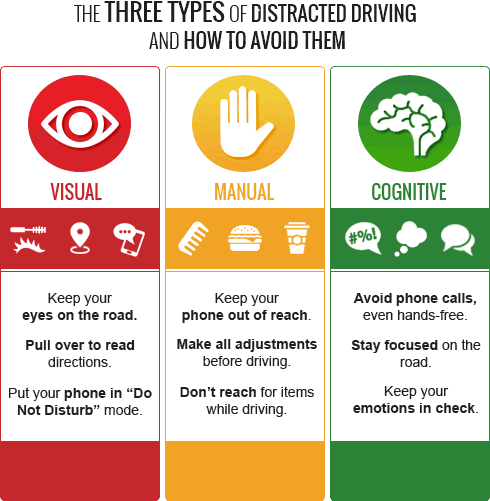Distracted Driving - What can YOU do about it?
According to the National Highway Safety Administration, more than 70% of licensed drivers in the USA admit that they read and text while driving. Texting is not the only distraction while driving. Some people put on makeup, turn to face their passengers instead of the road, look at their radios while operating them, eat, smoke and many other simple distractions while behind the wheel. You cannot drive safely unless the task of driving has your full attention. Any non-driving activity you engage in is a potential distraction and increases your risk of crashing. Distracted driving is a dangerous epidemic on America’s roadways. In 2014 alone, 3,179 were killed in distracted driving crashes. (Check out some the alarming statistics NHSA gathered between 2006-2015 here.)

The basic take away is to pay attention while driving. As stated above and worth repeating: Any non-driving activity you engage in is a potential distraction and increases your risk of crashing.
But, being a safe driver only helps if everyone around you is as respectful as you are. Wouldn't that be a perfect world? Unfortunately, each year the percentage of distracted driving accidents increased between 1.5-3% annually between 2006 - 2014. Also, keep in mind that statistics have shown an average of 50% of people on the road at all times are engaging in other activities while driving (texting on cell phones being the leading distraction).
So what can you do to better the odds? GET INVOLVED!
Sites like www.itcanwait.com provides ideas on how to disengage from the texting distraction while driving. If you send “#X” before you start your engine, your friends will be alerted that you are driving and that the next text can wait. An idea is to draw an X on your thumb to remind you to “#X” before you put your vehicle in Drive.
Your State legislature and governor make the laws regarding distracted driving. Many States now have laws against texting, talking on a cell phone, and other distractions while driving. Does your state? If not, join the fight to make the law! If your state already has laws in place, make sure they are being upheld.
Lead by example! If you're teaching your loved ones to avoid distracted driving, make sure you aren't doing such.
Be heard! Be a strong voice and advocate against distracted driving in your community.
